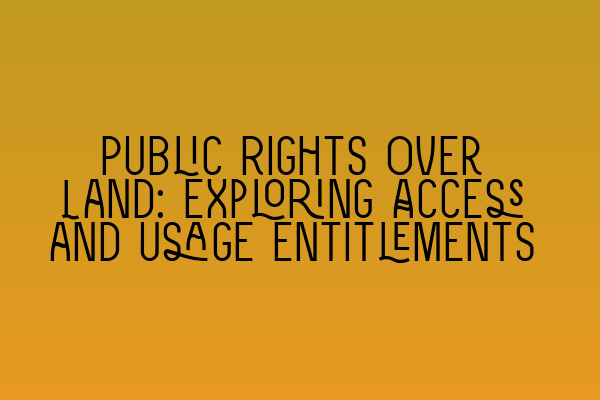Public Rights Over Land: Exploring Access and Usage Entitlements
Welcome to the SQE Property Law & Land Law blog! In this article, we will delve into the fascinating topic of public rights over land and explore the various access and usage entitlements that individuals and communities may have. Understanding these rights is crucial for solicitors practicing property law, as it can greatly impact land transactions and disputes.
The Importance of Public Rights Over Land
In any society, the concept of public rights over land plays a vital role in ensuring fairness and equitable access to resources. These rights grant individuals and communities the ability to use and enjoy certain portions of land for specific purposes. Public rights not only serve as a check on private landownership but also facilitate the proper functioning of public utilities, transportation networks, and recreational spaces.
Examples of public rights over land include rights of way, public footpaths, bridleways, and access to common land. These entitlements are typically established through legislation, historical use, or by prescription. By understanding the legal framework surrounding these rights, solicitors can provide effective counsel to their clients and help navigate any disputes that may arise.
Exploring Access Entitlements
Access entitlements refer to the rights of individuals or communities to access and traverse specific areas of land. These rights are often established to ensure public access to essential amenities and services. Let’s take a closer look at some of the common access entitlements:
- Rights of Way: A right of way is a legal right for a person to pass through someone else’s property. It can be either public or private and may exist for various purposes such as pedestrian access, vehicular access, or utilities installation. Understanding the scope and limitations of rights of way is crucial for solicitors involved in property transactions.
- Public Footpaths and Bridleways: Public footpaths and bridleways provide access for pedestrians and equestrians, respectively, in rural and urban areas. These paths often exist for recreational purposes and are designated as such through local authority decisions or historical use. Solicitors involved in property transactions in areas with public footpaths and bridleways must consider these access rights when advising their clients.
- Access to Common Land: Common land refers to areas owned by a community or group of individuals, where certain rights and privileges are shared. These rights may include grazing livestock, collecting firewood, or recreational activities. Understanding the limitations and restrictions on the use of common land is essential for solicitors advising clients on land transactions involving common land.
As solicitors, it is crucial to consider these access entitlements when dealing with property transactions or resolving disputes. Failure to adequately address public access rights can result in legal complications and potential challenges to title.
Exploring Usage Entitlements
Usage entitlements refer to the rights of individuals or communities to use specific areas of land for specific purposes. These rights ensure that land is utilized in a manner that benefits the public or serves particular community needs. Here are some common examples of usage entitlements:
- Public Parks and Recreation Areas: Public parks and recreation areas provide spaces for individuals and communities to engage in recreational activities, enjoy nature, and socialize. Solicitors must consider the legal framework and any restrictions or regulations in place when advising clients on the purchase or development of land intended for public park use.
- Public Utilities: Public utilities, such as water and sewage systems, electrical power lines, and telecommunications infrastructure, require specific areas of land for their operation. These rights are typically established through agreements, easements, or statutory provisions. When dealing with land transactions involving public utilities, it is vital for solicitors to understand the legal framework governing these usage entitlements.
- Rights to Extract Natural Resources: In some cases, public rights over land include the right to extract natural resources, such as minerals or timber. These rights are often subject to strict regulations and require proper authorization from relevant authorities. Solicitors involved in land transactions involving the extraction of natural resources must ensure compliance with applicable laws and regulations.
Understanding the usage entitlements associated with specific areas of land is crucial for solicitors advising clients on property transactions or potential land development. Failure to consider these entitlements can result in legal complications and potentially costly consequences.
Conclusion
Public rights over land are a fundamental aspect of property law and play a crucial role in ensuring fair access and usage of land within a society. As solicitors practicing property law, it is essential to have a comprehensive understanding of the various access and usage entitlements that individuals and communities may have.
By considering the rights of way, public footpaths, bridleways, access to common land, public parks, utilities, extraction rights, and other relevant entitlements, solicitors can effectively advise their clients on property transactions, resolve disputes, and help safeguard their clients’ interests.
For more information on property law, land law, and other legal topics, please refer to our related articles:
- Interactive SQE Mock Tests for Contract Law: Test Your Knowledge
- Join Our SQE Contract Law Webinars: Expert Insights and Guidance
- Contract Law Reforms: An Analysis of Recent Changes
- Parties in a Contract: Rights and Responsibilities
- The Importance of Ethics in Contract Law: A Comprehensive Guide
Thank you for reading! We hope this article has provided valuable insights into public rights over land and their implications for property law practice. Stay tuned for more engaging content from SQE Property Law & Land Law.
